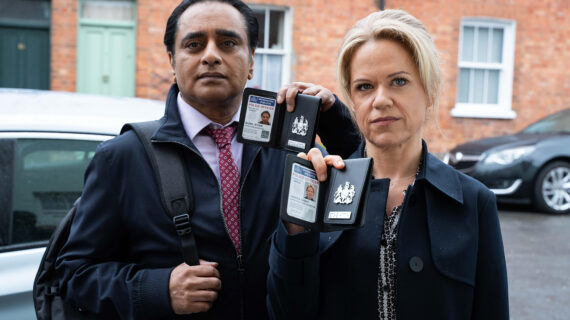Frederica Freyberg:
The Wisconsin Pension Fund, ranked as one of the most fiscally sound in the nation, took bold action this year. It invested in Bitcoin. Most all government workers are part of the Employee Trust Fund that pays out retirement benefits. But for a pension fund widely known for being stable, prudent and smart with investments, is this a departure or right on brand? Our next guest says it’s certainly turning heads. We should note PBS Wisconsin employees are participants in the Wisconsin Retirement System. We are joined by David Krause, Marquette University emeritus associate professor of finance. And thanks very much for being here.
David Krause:
Yes, thank you.
Frederica Freyberg:
So what is the reaction within the kind of investment industry to this news?
David Krause:
The investment industry is pretty amazed that a pension fund this early in the introduction of the Bitcoin ETF came on board. They expected it might take several years before there would be institutional involvement with Bitcoin investing.
Frederica Freyberg:
So Bitcoin ETF is different and apart from the kind of bitcoins that folks might have in their digital wallets.
David Krause:
Yeah, that’s right. It was January of this year that the Spot Bitcoin ETF was approved by the SEC. That allowed investors like the university systems or SWIB, in this case, the Wisconsin Investment Board, to buy directly these securities that are regulated by the SEC, highly liquid and traded on exchanges.
Frederica Freyberg:
Still, was it a surprise to you to see that?
David Krause:
It was, but Wisconsin’s investment board has always been innovative. This is a fully funded pension fund. So in a way, they have the luxury of being able to invest for the long term. They don’t need to worry as much about liquidity as, say, the pension fund for the state of Illinois, which is only funded at 50% of its level.
Frederica Freyberg:
Should it cause pensioners though, or workers, to worry given the volatility of Bitcoin?
David Krause:
A lot of assets are volatile. If you really were to look deep down into the portfolio, you would see that a lot of assets, including some stocks as well as some other alternative investments are quite volatile in nature. Yeah, Bitcoin has moved around a lot, but supply and demand are starting to balance out. And I do think the investment community is beginning to understand this more as a viable alternative investment.
Frederica Freyberg:
So how much are they putting into Bitcoin compared to the fund itself?
David Krause:
Compared to the fund itself, it’s just a toe in the water. It’s 1/10 of 1%. Now $180 million is not pocket change. But this is a $180 billion fund. I think it’s just an entry point. I think they’re testing to see the reaction of the public to whether or not there’s resistance to owning this. And they’re using it as a trial run, because it really is not going to impact the portfolio substantial, until you get to maybe a 1% or 2% positioning.
Frederica Freyberg:
Because I was going to ask you, what does your expertise tell you about whether this is a good investment for the pension fund?
David Krause:
Well, it’s a good investment in the sense that it’s going to add diversification. The objective of a portfolio manager or a fund is to maximize return while minimizing risk. Bitcoin, like other alternative investments, does not move in parallel with stocks and bonds. So therefore it adds nice diversification effect. The potential upside returns are high as it could be with any new technology. And finally, because this is a currency with a limited supply, it actually can serve as an inflation hedge. I don’t think very many people talk about the potential for it to remove volatility of government actions.
Frederica Freyberg:
Do you expect other states to follow suit? Watch this closely and follow?
David Krause:
Oh I do, I do. Now I don’t expect those that are underfunded can afford to do that because this is a long play. I mean, the state of Wisconsin can afford to go through maybe several cycles. I think the long term trend of this type of assets is going to be upward slope, but there’s going to be dips. There’s going to be peaks, but if you’re a pension fund with low liquidity, you really can’t afford long plays.
Frederica Freyberg:
Do you feel like Wisconsin’s investment in Bitcoin legitimizes it?
David Krause:
It does. The day that it was announced — that’s when the SEC 13F form became available to the public, that day Bitcoin went up 1%. Now is it solely attributable to the fact that an institutional investor bought those? I think so. So I think the market did pay attention to that. And I would not be surprised to see other institutional investors move into this asset category.
Frederica Freyberg:
David Krause, thanks very much.
David Krause:
Thank you.
Search Episodes
Related Stories from PBS Wisconsin's Blog

Donate to sign up. Activate and sign in to Passport. It's that easy to help PBS Wisconsin serve your community through media that educates, inspires, and entertains.
Make your membership gift today
Only for new users: Activate Passport using your code or email address
Already a member?
Look up my account
Need some help? Go to FAQ or visit PBS Passport Help
Need help accessing PBS Wisconsin anywhere?

Online Access | Platform & Device Access | Cable or Satellite Access | Over-The-Air Access
Visit Access Guide
Need help accessing PBS Wisconsin anywhere?

Visit Our
Live TV Access Guide
Online AccessPlatform & Device Access
Cable or Satellite Access
Over-The-Air Access
Visit Access Guide
 Passport
Passport

















Follow Us